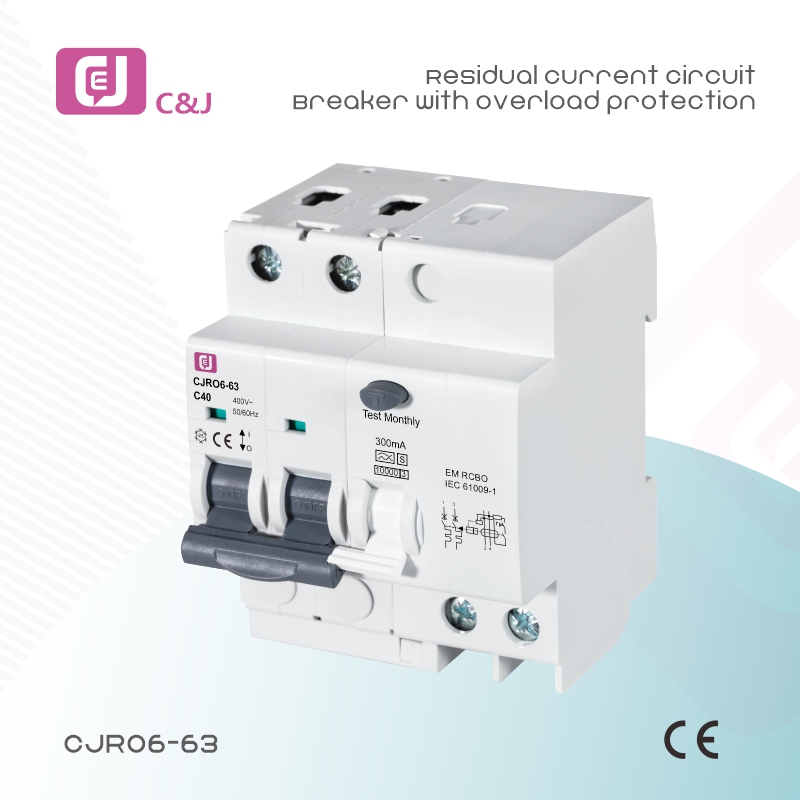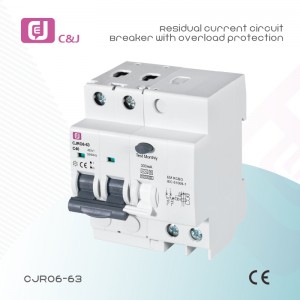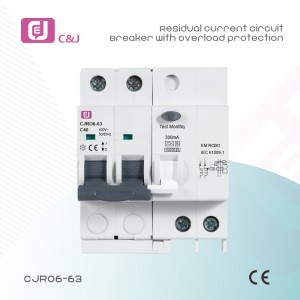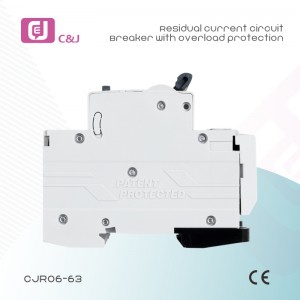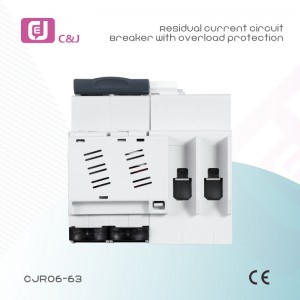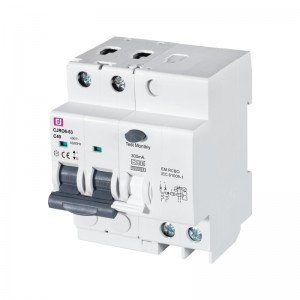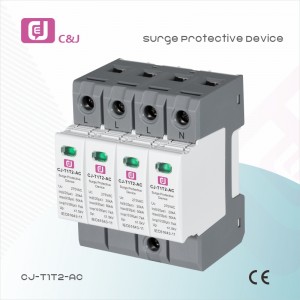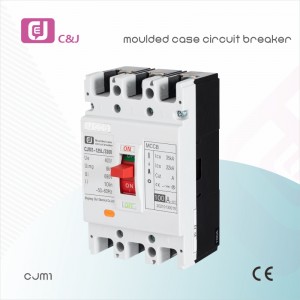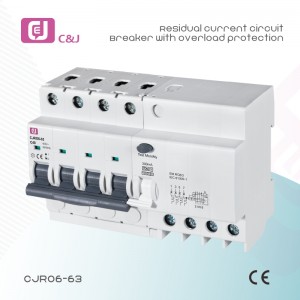Wholesale price CJRO6-63 2P 6-63A DIN Rail mounting RCBO residual current circuit breaker with overload protection
Installation
| Fault current in dicator | YES |
| Protection degree | IP20 |
| Ambient temperature | 25°C~+40°C and its average over a period of 24h does not exceed +35°C |
| Storage temperature | -25°C~+70°C |
| Terminal connection type | Cable/U-type busbar/Pin-type busbar |
| Terminal size top for cable | 25mm² |
| Tightening torque | 2.5N.m |
| Mounting | On DIN rail FN 60715 (35mm) by means of fast clip device |
| Connection | Top and bottom |
Overload Current Protection Characteristics
| Test procedure | Type | Test Current | Initial State | Tripping or Non-tripping Time Limit | Expected Result | Remark |
| a | B,C,D | 1.13In | cold | t≤1h | no tripping | |
| b | B,C,D | 1.45In | after test a | t<1h | tripping | The current steadily rises to the specified value within 5s |
| c | B,C,D | 2.55In | cold | 1s<t<60s | tripping | |
| d | B | 3In | cold | t≤0.1s | no tripping | Turn on the auxiliary switch to close the current |
| C | 5In | |||||
| D | 10In | |||||
| e | B | 5In | cold | t<0.1s | tripping | Turn on the auxiliary switch to close the current |
| C | 10In | |||||
| D | 20In |
Residual Current Operating Breaking Time
| Type | In/A | I△n/A | Residual Current (I△) Is Corresponding To The Following Breaking Time (S) | ||||
| AC Type | any value |
any value |
1ln | 2In | 5In | 5A,10A,20A,50A 100A,200A,500A |
|
| A Type | >0.01 | 1.4In | 2.8In | 7In | |||
| 0.3 | 0.15 | 0.04 | Max Break-time | ||||
| The general type RCBO whose current IΔn is 0.03mA or less can use 0.25A instead of 5IΔn. | |||||||
Applicaitons
Leakage circuit breaker with overload protection: ensure electricity safety
In today’s world where technology plays a vital role in our daily lives, it is essential to have a safe and reliable power system. One of the key components to ensure the safety of electricity use is the leakage circuit breaker with overload protection function. This device is becoming increasingly popular due to its ability to detect fault currents and provide effective protection against electric shock and fire hazards. Let’s delve into the application of this intrinsically safe device.
Residual current circuit breakers with overload protection, commonly known as RCBOs, are widely used in residential, commercial and industrial applications. In a residential setting, they are installed to prevent electrical accidents in the home. The RCBO continuously monitors the circuit and disconnects the power supply if it detects any fault current. This protects individuals from electric shock, especially in areas such as kitchens or bathrooms where there is a high risk of water and electricity contact.
Commercial establishments such as offices and stores also use RCBOs to keep employees and customers safe. As the number of appliances and equipment increases, the risk of overloading or electrical failure increases significantly. RCBOs provide protection for these situations, preventing property damage and potential injury. Additionally, they minimize downtime due to electrical failures, helping to maintain the continuity of business operations.
In industrial settings, RCBOs play a vital role in protecting workers and machinery. Factories and manufacturing plants are often equipped with heavy machinery and high power equipment, which can cause dangerous electrical failures. Adding RCBOs to the electrical system can accurately detect and respond to abnormal currents, ensuring the safety of the entire installation. These devices contribute to smoother operations and increased productivity by preventing costly breakdowns and accidents.
In addition to the core function of residual current protection, RCBOs also provide overload protection. This means they can detect excessive electrical loads and trip circuit breakers to prevent damage to circuits or equipment. This feature is especially useful as it helps prevent electrical fires caused by overloading. With the ever-increasing demands of modern electricity, there is a great risk of circuit overloading. Therefore, RCBOs are an important line of defense against such hazards and increase overall electrical safety.
In a word, the application of residual current circuit breaker with overload protection function is extensive and important. Whether in a residential, commercial or industrial setting, these devices play an important role in ensuring electrical safety. By continuously monitoring faults, detecting abnormal currents, and providing overload protection, RCBOs protect people and property from electrical shock and fire hazards. Investing in these devices is not only a legal requirement in many jurisdictions, but it is also a prudent step towards creating a safer electrical environment for everyone.


